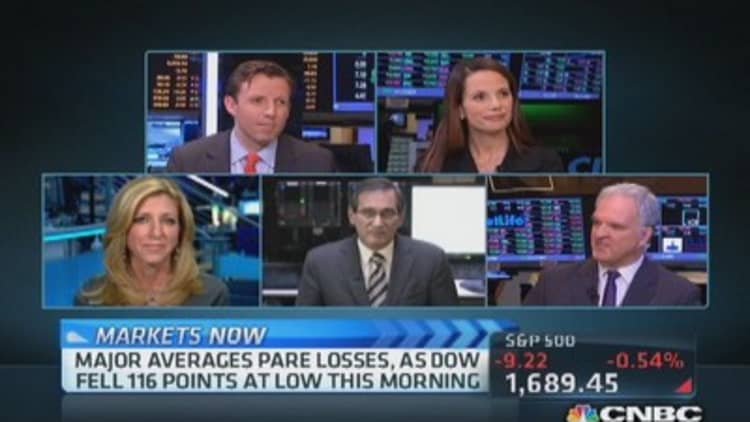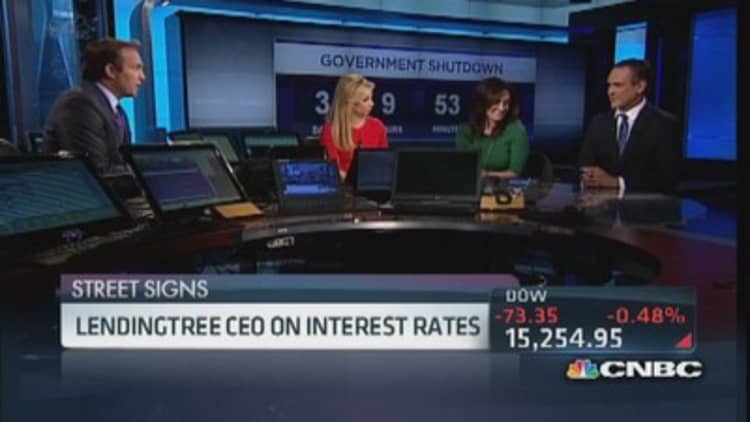Stocks finished in the red Friday, with major averages closing lower for the first week in four, as mounting concerns of a potential government shutdown spooked Wall Street.
"It looks like we're going to have a [government] showdown on Monday and a showdown on Monday is a problem for traders and portfolio managers as it's the end of the quarter," said Art Cashin, director of floor operations at UBS Financial Services.
U.S. Major Index Performance
| Last | Today's % Change | 1 Week % Change | MTD % Change | QTD % Change | YTD % Change | |
| Dow | 15258.24 | -0.46% | -1.25% | 3.02% | 2.34% | 16.44% |
| S&P 500 | 1691.75 | -0.41% | -1.06% | 3.60% | 5.32% | 18.62% |
| NASDAQ | 3781.59 | -0.15% | 0.18% | 5.34% | 11.12% | 25.24% |
| Russell 2000 | 1074.19 | -0.39% | 0.13% | 6.26% | 9.89% | 26.47% |
| CBOE VIX | 15.45 | 9.89% | 17.76% | -9.17% | -8.36% | -14.26% |
The Dow Jones Industrial Average fell 70.06 points to finish at 15,258.24, declining for the sixth day in seven, dragged by Cisco and IBM.
The dropped 6.92 points to close at 1,691.75. And the Nasdaq slid 5.83 points to end at 3,781.59.
"If you believe as I do that somehow or another this government shutdown issue will be resolved before, on, or a little after the cutoff date, you may want to consider nibbling on the long side if the S&P goes down to the 1,670 area," wrote Elliot Spar, market strategist at Stifel Nicolaus.
The CBOE Volatility Index (VIX), widely considered the best gauge of fear in the market, jumped above 15.
For the week, the Dow slumped 1.25 percent, the S&P 500 declined 1.06 percent, while the Nasdaq eked out a gain of 0.18 percent. Nike was the best weekly performer on the blue-chip index, while Goldman Sachs tumbled.
All 10 S&P sectors ended in the red for the week, dragged by consumer staples and financials.

Budget spending must be agreed by Congress before October 1 to prevent a government shutdown which could involve federal employees facing unpaid temporary leave and a delay in the payment of military personnel. Most analysts expect a deal to be reached, even if it is at the last minute, since lawmakers are unlikely to want to risk any fallout at the 2014 Congressional elections.
(Read more: Small business fears of Obamacare may be overblown)
Worries over a potential partial government shutdown next week helped kept buyers on the sidelines.
The Senate passed a short-term spending bill that would help U.S. agencies operating after Sept. 30 when the fiscal year ends. The measure must now be approved by the Republican-controlled House.
President Barack Obama said the Senate acted responsibly by voting to keep the government open and now it's up to Republicans in the House to do the same. Obama also said health-care exchanges will be open on Tuesday even if the government shuts down.
"It's hard to forecast the behavior of politicians—but part of the negotiating tactics in these situations seems to be taking it to the eleventh hour," said Lawrence Creatura, portfolio manager of the Clover Small Value Fund at Federated Investors. "We've faced times like this in the past and the sun rises again over the stock market—so often times, the barks surrounding these events are much worse than the eventual reality…but in anticipation of the choppiness, investors can go into the defensive sectors."

Meanwhile, Reuters reported on Wednesday that Senior Republican Jeff Sessions said there would be no shutdown or government default. House speaker John Boehner said a Republican proposal was coming that would tie federal government spending cuts to a U.S. debt limit increase.
(Read more: Brawl in US Congress—should the world care?)
Also keeping traders on edge, Chicago Fed president Charles Evans said the central bank could start reducing its asset purchases this year based on economic forecasts but the decision to wind back stimulus may be delayed to next year.
Meanwhile, New York Fed President William Dudley reiterated his stance for the central bank's bond-buying program, saying the labor market is not yet healthy and inflation should firm in the months ahead.
And Minneapolis Fed president Narayana Kocherlakota said the next Fed chairman will need to resist the temptation to wind down the central bank's monetary stimulus in the face of rising criticism of the super-easy policies. Ben Bernanke's term as Fed chairman ends in January and current Vice Chair Janet Yellen is widely seen to be his likely successor.
On the economic front, consumer sentiment fell to 77.5 in September, hitting its lowest in nearly five months, according to the Thomson Reuters/Unversity of Michigan's final reading on the overall index. The reading lower than the 78.0 economists had expected in a Reuters poll, but still higher than a mid-month preliminary reading of 76.8.
And household spending ticked up 0.3 percent in August, according to the Commerce Department.
JCPenney plunged sharply to lead the S&P 500 laggards after the retailer priced 84 million shares of common stock at $9.65 each through Goldman Sachs. At least three brokerages slashed their price target on the company.
BlackBerry posted a quarterly loss of nearly $1 billion, as previously warned, which included a writedown for unsold Z10 smartphones, the company's latest device that the firm had hoped would reverse its struggling business. Earlier this week, BlackBerry signed a tentative $9-a-share agreement to be acquired by a consortium led by Fairfax Financial, its largest shareholder.
(Read more: Canada's Harper suggests BlackBerry deal review)
Nike spiked higher after the newly-minted Dow component posted quarterly results that exceeded Wall Street expectations, helped by strong sales in gains in North America and Europe. In addition, at least seven brokerages upped their price targets on the sports apparel retailer. Smaller rivals Under Armor and Foot Locker also rallied.
Lumber Liquidators dropped after a report that federal authorities executed a search warrant at the hardwood flooring retailer's headquarters.
—By CNBC's JeeYeon Park (Follow JeeYeon on Twitter: @JeeYeonParkCNBC)
Coming Up Next Week:
MONDAY: Chicago PMI, Dallas Fed mfg survey, new Kindle ships
TUESDAY: PMI mfg index, ISM mfg index, construction spending, auto sales; Earnings from Walgreen, Global Payments
WEDNESDAY: Mortgage applications, ADP employment report, Bernanke speaks, Dell event; Earnings from Monsanto
THURSDAY: Challenger job-cut report, jobless claims, factory orders, ISM non-mfg index, natural gas inventories, Fed's Fisher speaks, Fed Gov Powell speaks, Fed balance sheet/money supply; Earnings from Constellation Brands
FRIDAY: Nonfarm payrolls, Fed's Kocherlakota speaks
What's Trending on CNBC.com:


